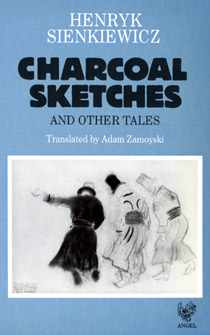RRP: £10.95
BINDING: Paperback
PUBLISHED: 1990
ISBN: 9780946162321
PAGES: 212
Henryk Sienkiewicz
Charcoal Sketches and other tales
Translated from the Polish by Adam Zamoyski
On his death in 1916, Henryk Sienkiewicz, author of panoramic historical novels such as With Fire and Sword and The Deluge, enjoyed a towering reputation; he is still the most celebrated Polish novelist. But the three novellas in this selection display their author at his best: his engaging humour and his brilliance at bringing history to life. Charcoal Sketches is a headlong satire on village life in Russian-ruled Polish territory after the failure of the Insurrection of 1863/64. The brawny Bartek in Bartek the Conqueror, a hero of the Franco-Prussian War but no match for the Germans in the post-war peace, embodies the fate of the Polish peasantry in the west. On the Bright Shore is a deliciously observed study of manners and morals among the expatriate Polish gentry on the French Riviera in the 1890s.
These three narratives are not otherwise available together in English.
‘The three novellas in this selection … display their author at his best; his narrative mastery, his engaging irony, and his brilliance at bringing history to life.’ – Polish Heritage
‘Zamoyski’s sprightly translations demonstrate that the passage of a century cannot disguise the wit or lessen the bite of these novellas.’ – Publishers Weekly
HENRYK SIENKIEWICZ was born in 1846, of an impoverished noble family, in that part of Poland which had fallen to Russia in the partition of 1793. Having joined the new Polish urban intelligentsia, as a young writer he was swept up in the Positivist movement which aimed at Polish cultural self-strengthening following the trauma of the failed insurrection of 1863–64, but his natural pessimism won through, evident in the telling satire of his short fiction, some of the best of which was written on visits to America, France and Italy. The novels of his later career, when he found himself in the position of spokesman for a country ruled by three foreign powers – Russia, Austro-Hungary and Prussia – are heavily overlaid with now dated patriotism. He was awarded the Nobel Prize for Literature in 1905. By the outbreak of war in 1914 he had settled in Switzerland, where he joined Paderewski in forming a Polish National Committee, eventually to be recognised as the Polish provisional government. He died in Swizerland in 1916.


